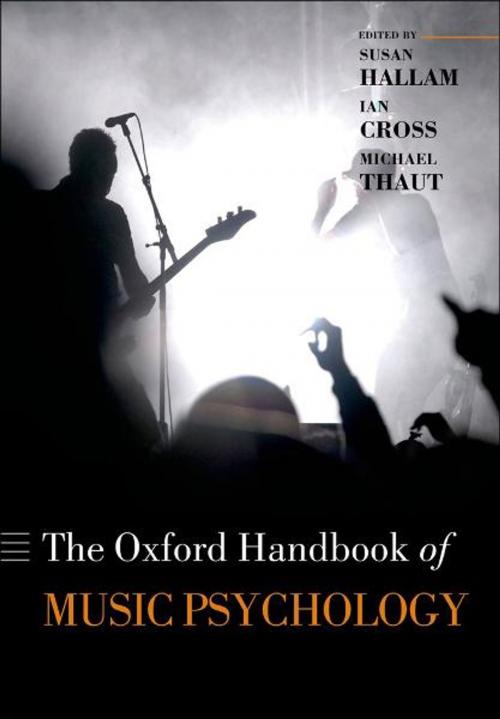Oxford Handbook of Music Psychology
Nonfiction, Health & Well Being, Psychology, Developmental Psychology, Entertainment, Music| Author: | ISBN: | 9780191620744 | |
| Publisher: | OUP Oxford | Publication: | May 26, 2011 |
| Imprint: | OUP Oxford | Language: | English |
| Author: | |
| ISBN: | 9780191620744 |
| Publisher: | OUP Oxford |
| Publication: | May 26, 2011 |
| Imprint: | OUP Oxford |
| Language: | English |
The field of Music Psychology has grown dramatically in the past 20 years, to emerge from being just a minor topic to one of mainstream interest within the brain sciences. However, until now, there has been no comprehensive reference text in the field. The Oxford Handbook of Music Psychology is a landmark text providing, for the first time ever, a comprehensive overview of the latest developments in this fast-growing area of research. With contributions from over fifty experts in the field, the range and depth of coverage is unequalled. All the chapters combine a solid review of the relevant literature with well-reasoned arguments and robust discussions of the major findings, as well as original insights and suggestions for future work. Written by leading experts, the 52 chapters are divided into 11 sections covering both experimental and theoretical perspectives, each edited by an internationally recognised authority Ten sections each present chapters that focus on specific areas of music psychology: - the origins and functions of music - music perception - responses to music - music and the brain - musical development - learning musical skills - musical performance - composition and improvisation - the role of music in our everyday lives - music therapy and conceptual frameworks In each section, expert authors critically review the literature, highlight current issues, and explore possibilities for the future. The final section examines how in recent years the study of music psychology has broadened to include a range of other scientific disciplines. It considers the way that the research has developed in relation to technological advances, fostering links across the field and providing an overview of the areas where the field needs further development in the future. The Oxford Handbook of Music Psychology will be the essential reference text for students and researchers across psychology and neuroscience.
The field of Music Psychology has grown dramatically in the past 20 years, to emerge from being just a minor topic to one of mainstream interest within the brain sciences. However, until now, there has been no comprehensive reference text in the field. The Oxford Handbook of Music Psychology is a landmark text providing, for the first time ever, a comprehensive overview of the latest developments in this fast-growing area of research. With contributions from over fifty experts in the field, the range and depth of coverage is unequalled. All the chapters combine a solid review of the relevant literature with well-reasoned arguments and robust discussions of the major findings, as well as original insights and suggestions for future work. Written by leading experts, the 52 chapters are divided into 11 sections covering both experimental and theoretical perspectives, each edited by an internationally recognised authority Ten sections each present chapters that focus on specific areas of music psychology: - the origins and functions of music - music perception - responses to music - music and the brain - musical development - learning musical skills - musical performance - composition and improvisation - the role of music in our everyday lives - music therapy and conceptual frameworks In each section, expert authors critically review the literature, highlight current issues, and explore possibilities for the future. The final section examines how in recent years the study of music psychology has broadened to include a range of other scientific disciplines. It considers the way that the research has developed in relation to technological advances, fostering links across the field and providing an overview of the areas where the field needs further development in the future. The Oxford Handbook of Music Psychology will be the essential reference text for students and researchers across psychology and neuroscience.















